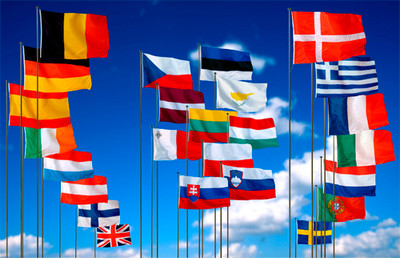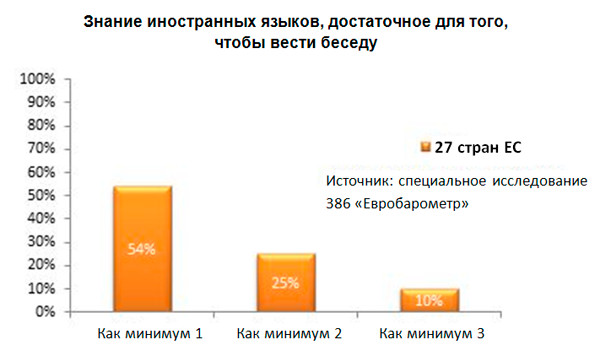Europeans and European languages: translate or not translate?
- Transfer
 Europe is known for its linguistic diversity: in this part of the world they speak 23 official languages and more than 60 regional languages of the indigenous population. In addition, according to the full report of the European Commission of 2012 “Europeans and European Languages”, many migrants who come to Europe speak their native languages.
Europe is known for its linguistic diversity: in this part of the world they speak 23 official languages and more than 60 regional languages of the indigenous population. In addition, according to the full report of the European Commission of 2012 “Europeans and European Languages”, many migrants who come to Europe speak their native languages. How, then, in the presence of such a variegated language environment, can one decide how appropriate translation will be?
Recently, TNS, which conducts research on public opinion and social networks in 27 states of the European Union, has prepared a report on how Europeans use and perceive languages. And I would like to acquaint you with some of the most interesting conclusions made in this document.
Almost all Europeans speak several languages - this is a fallacy
According to the report, 54% of Europeans are able to talk in at least one language other than their native language. Every fourth European, besides his native language, speaks two more languages, every tenth knows three or more foreign languages.

This is a fairly high indicator compared to the global average. But almost half of the region’s 740 million people speak only one language. Moreover, when respondents were asked if they knew any foreign language well enough to communicate on the Internet, this figure dropped to 39%. In other words, less than 40% of Europeans speak a foreign language at a level that allows them to communicate and contact on the Internet. In particular, for English - the currently prevailing foreign language in the EU - this figure is 26%.
I would like to add the data from a previous study to these indicators: 9 out of 10 Europeans prefer to browse the Internet in their native language . This is an amazing number, and it becomes clear how many opportunities you miss if your site, for example, is made only in English.
The three most common foreign languages in EU Member States
In 19 out of 25 EU member states (except Great Britain and Ireland), the main language of communication is English. Firstly, it is a foreign language that is spoken by most people, and secondly, this language is the most preferable for learning: 67% of Europeans called English one of the two most useful languages for themselves. English is far ahead of German (17%), French (16%), Spanish (14%) and Chinese (6%).
In addition to English, the two most common foreign languages are French and German. A significant fact: a comparison of these results with the results of a similar study in 2005 showed that the subjective significance of studying French and German significantly decreased. In other words, today, knowledge of these languages is not considered as useful as before.
Foreign languages, the knowledge of which allows you to conduct a conversation, -

The level of multilingualism in different EU countries is very different
The above table shows that the level of multilingualism in European countries is very different. To demonstrate this as clearly as possible, five countries with the highest level and five countries with the lowest level of multilingualism are presented below.

This is very valuable information for those who are thinking about whether or not to spend money on translating a website into a foreign language. For example, if your customers are located in the Netherlands, most likely, translating your site from English will not bring much benefit, and vice versa - such benefit will be if you plan, say, to enter the market of Hungary, Italy or Portugal.
In favor of multilingualism, but not at the expense of native languages
Residents of Europe demonstrate a high level of openness to foreign languages: more than 8 out of 10 Europeans claim that knowledge of languages other than their native language is very useful, and all EU citizens must speak at least one foreign language.
Moreover, most Europeans advocate the ability to speak one “common language” for all EU member states, while 81% say that all languages should, as before, be equal. This is a very important reservation, which reflects the growing popularity of the view that all languages should have equal rights (compared to the 2005 study). The report says:
(...) most Europeans support the idea that all EU citizens should speak one common language, but this point of view does not mean that any language should have an advantage over other languages.
Multilingualism DOES NOT Increase
Of course, EU citizens' knowledge of several languages is of great importance to achieve the stated goal - the creation of a developing united Europe. The influence of multilingualism on labor mobility, competitiveness and the functioning of the EU economy in a global market should not be underestimated.
Often (and quite justifiably) the Internet is called the force that connects us all - geographically, culturally and linguistically, but "there are no signs that the level of multilingualism in the EU is rising."
The report shows that the proportion of Europeans who, according to them, speak a foreign language, compared with 2005 data, decreased slightly. Basically, this decrease is due to a significant decrease in the number of people who know Russian and German in Central and Eastern Europe - Slovakia, the Czech Republic, Bulgaria, Poland and Hungary.
Moreover, foreign languages are increasingly used for “regular” communication on the Internet (an increase of 10 percentage points compared to 2005).
Instead of a conclusion
Each member state of the European Union defines its own policy in the field of education and language learning, therefore, to be honest, a united, "speaking one language" Europe is a utopia.
Moreover, the ability to speak a language does not always mean that a person often uses it, for example, is actively searching for products or services on the Internet in that language. Therefore, when developing a “roadmap” for the expansion of Europe, it is necessary to remember: in this region there is no “golden rule”, a single language, or a single cultural identity.
Summarizing all of the above, it should be noted that translating a website into a huge number of languages used in Europe is often not economically feasible. Therefore, you can define groups of countries with similar linguistic and cultural characteristics and create, for example, a website in English for the Netherlands and Scandinavian countries, in Russian for the Baltic countries, etc. For countries with a low level of knowledge of several foreign languages, it is worth determining the ratio of the potential economic effect and the cost of translating the site. Using a foreign language for the target audience in countries such as Portugal, Hungary, Italy and Poland will be a waste of time, effort and money.
Of course, such an approach is likely to put you in obviously losing terms from a language point of view, compared with local competitors. However, certain benefits can be achieved by expanding your company internationally. On the other hand, it is quite obvious that the ideal solution is to use the native language for the target audience in any country. And often it is this factor that becomes crucial for success.
Translation into Russian by ABBYY Language Services .
